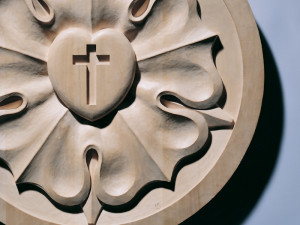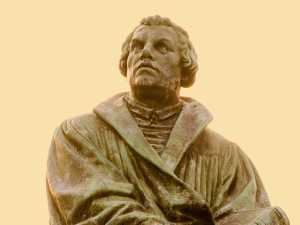by Dr. Jack Kilcrease
 Martin Luther was born in Eisleben on November 10, 1483 to Hans and Margarethe Luder. Martin himself later modified the family name “Luder” to “Luther” in the mid-1510s possibly because of its similarity to Eleutherius, meaning the “free one” (i.e., one who possesses Christian freedom).
Martin Luther was born in Eisleben on November 10, 1483 to Hans and Margarethe Luder. Martin himself later modified the family name “Luder” to “Luther” in the mid-1510s possibly because of its similarity to Eleutherius, meaning the “free one” (i.e., one who possesses Christian freedom).
Whereas Luther’s mother was from an economically prosperous family, his father was from more humble origins. His family was nevertheless very upwardly mobile. The year after Luther’s birth, his family moved to Mansfeld where his father worked in the copper mining industry. He was moderately successful at this, although in his later life he would fall on harder times. Through his thrift and hard work, Luther’s father was eventually able to build up his business to the point where he could hire others to work for him and financially provide for his son’s education.
Luther’s parents more or less held the religious belief of the era. They named him “Martin” after St. Martin of Tours, whose feast day (November 11) their son’s baptism fell on. Luther’s parents also believed in popular late medieval superstitions. In particular, they inculcated in him a strong belief in witches and the power of the demons. Luther continued to hold these beliefs in later life.
 As an upwardly mobile middle class person of his time, Hans Luder sought the advancement of his oldest son, Martin. His ultimate ambition was for Martin to become an attorney and then perhaps a Burgomeister (i.e., a town mayor). In order to achieve these goals, Hans sent Martin to Latin school first in Mansfeld, and then later in Magdeburg. The Latin school at Magdeburg was operated by a lay religious movement known as the “Brethren of the Common Life.” They sought to cultivate a quasi-monastic inner communion with God, while simultaneously living as laypeople and pursuing secular vocations. Some have seen a connection between their form of spiritual life and Luther’s later ideas about sacredness of secular vocations.
As an upwardly mobile middle class person of his time, Hans Luder sought the advancement of his oldest son, Martin. His ultimate ambition was for Martin to become an attorney and then perhaps a Burgomeister (i.e., a town mayor). In order to achieve these goals, Hans sent Martin to Latin school first in Mansfeld, and then later in Magdeburg. The Latin school at Magdeburg was operated by a lay religious movement known as the “Brethren of the Common Life.” They sought to cultivate a quasi-monastic inner communion with God, while simultaneously living as laypeople and pursuing secular vocations. Some have seen a connection between their form of spiritual life and Luther’s later ideas about sacredness of secular vocations.
The chief object of study at these schools was the Latin language, which was essential for participation in the intellectual life of Europe in the sixteenth century. Beyond this, Luther also studied the medieval trivium: grammar, rhetoric, and logic. Martin did not enjoy his time at these schools, since the chief incentive for learning was the avoidance of beatings. In some of his later reminiscences, Luther compared his time in these schools to purgatory or hell.
 In 1501, Luther enrolled at the University of Erfurt where he studied for his undergraduate degree. This was the penultimate step toward his goal of becoming an attorney. He graduated in 1505 (second in his class) and was poised to begin his study of law. During the interim, on his way home to visit his parents he became trapped in a thunderstorm. In the middle of the storm, he invoked St. Anne (the legendary mother of the Virgin Mary) and promised that if she saved him from the storm, he would become a monk. Since according to most monastic rules of this era, a person who made a vow of this nature need not fulfill it if it was made under fear or duress, it seems very likely that Luther had been thinking about the possibility of pursuing some kind of monastic existence long before actually making this vow.
In 1501, Luther enrolled at the University of Erfurt where he studied for his undergraduate degree. This was the penultimate step toward his goal of becoming an attorney. He graduated in 1505 (second in his class) and was poised to begin his study of law. During the interim, on his way home to visit his parents he became trapped in a thunderstorm. In the middle of the storm, he invoked St. Anne (the legendary mother of the Virgin Mary) and promised that if she saved him from the storm, he would become a monk. Since according to most monastic rules of this era, a person who made a vow of this nature need not fulfill it if it was made under fear or duress, it seems very likely that Luther had been thinking about the possibility of pursuing some kind of monastic existence long before actually making this vow.
Upon arriving at his parent’s house, Martin told his father that he was going to pursue a monastic existence. Luther’s father was enraged. Hans had partially bankrolled his son’s education with the expectation that he would take care of his parents in old age. Also, Luther tells us in later life, that although his father was faithful to the Church of Rome, he saw the clergy and the monks of his era as quite corrupt. In spite of his father’s disapproval, Martin joined the Augustinian Order in Erfurt. He threw himself into his monastic existence with a gusto that other members of the order found unusual.
 It is likely that part of the reason for this behavior was that at Erfurt (where Martin had attended college) the theology of William of Ockham and Gabriel Biel were taught and promoted. This theology was often called the via moderna (“the modern way”), in contrast to the via antiqua (“the old way”) of theologians like Peter Lombard and Thomas Aquinas. According to the via moderna, in order to partially merit the beginning of the process of salvation, humans had to do their best to make themselves morally upright. God would respond by giving the assistance of his grace. The problem with this was that what constituted doing one’s “best” is highly subjective. It inevitably led Luther into a spiritual crisis as he tried to go to more and more absurd lengths to merit God’s favor. In the coming decade and a half, this spiritual crisis help spur along Luther’s theological investigation of the Bible and ultimately led him to a new understanding of the Gospel.
It is likely that part of the reason for this behavior was that at Erfurt (where Martin had attended college) the theology of William of Ockham and Gabriel Biel were taught and promoted. This theology was often called the via moderna (“the modern way”), in contrast to the via antiqua (“the old way”) of theologians like Peter Lombard and Thomas Aquinas. According to the via moderna, in order to partially merit the beginning of the process of salvation, humans had to do their best to make themselves morally upright. God would respond by giving the assistance of his grace. The problem with this was that what constituted doing one’s “best” is highly subjective. It inevitably led Luther into a spiritual crisis as he tried to go to more and more absurd lengths to merit God’s favor. In the coming decade and a half, this spiritual crisis help spur along Luther’s theological investigation of the Bible and ultimately led him to a new understanding of the Gospel.
Jack Kilcrease is a member of Our Savior Lutheran Church, Grand Rapids, Mich.
